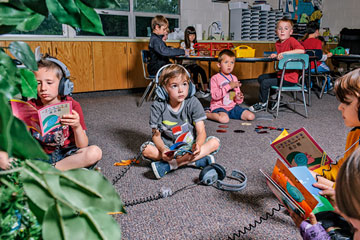
A group of Utah first-graders listen and read along in Mandarin.
Classrooms are places where little eurekas happen--and teachers live for them. The sixth-grader struggling with the first week of algebra has no idea what a nonsensical instruction like "solve for x" means--and then all at once, blink, the light goes on. The second-grader grasps for the first time why a poem doesn't have to rhyme and then coins a perfect little word picture to prove it. For Hélène Cha-Philippe, a teacher at Morningside Elementary School in Salt Lake City, the moment happened when one of her first-grade girls said, "I eat the teacher."
Technically, that's not what the little girl said. What she said was "Je mange le professeur." Then she laughed in delight and pride, and Cha-Philippe did too. Just months before, the child had not spoken a word of French. Now she spoke many words. That day, she was working with the verb manger and was supposed to say, "I eat the banana." Instead she made a tiny, silly, first-grader's joke. She had stopped wrestling with the language and had begun playing with it--and with that, she had crossed a threshold.
"It was such a wonderful experience," says Cha-Philippe. "She realized that it was possible to combine words and make a joke in a language that wasn't her own."
All over Utah, elementary-school students are joking and studying and singing and reading and fluently speaking in languages not their own: French, Spanish, Mandarin Chinese and, soon, Portuguese. They are part of one of the most ambitious total-immersion language-education programs ever attempted in the U.S. It kicked off in the 2009 school year with 1,400 students in 25 schools and by this fall will include 20,000 kids in 100 schools--or 20% of all the elementary schools in the state, with nearly 95% of school districts participating up through grade 12. Competition for spots in the program is keen: families apply online before kids enter kindergarten or first grade--depending on the school district--and the ones who will participate are picked by lottery. Those who are chosen take half their subjects each day in the new language and the other half in English.
The idea behind the program has less to do with the usual talk about a globalizing world and America's need to become a polyglot nation if it's going to compete effectively with China and other rising economies--though that's part of it--and more to do with the nimble minds of the boys and girls doing the learning. Research is increasingly showing that the brains of people who know two or more languages are different from those who know just one--and those differences are all for the better. Multilingual people, studies show, are better at reasoning, at multitasking, at grasping and reconciling conflicting ideas. They work faster and expend less energy doing so, and as they age, they retain their cognitive faculties longer, delaying the onset of dementia and even full-blown Alzheimer's disease.
A bilingual brain is not necessarily a smarter brain, but it is proving to be a more flexible, more resourceful one. In a polyglot world, that's a lesson that a largely monoglot country like the U.S. ignores at its peril. "Monolingualism," says Gregg Roberts, a language-immersion specialist with the Utah state office of education, "is the illiteracy of the 21st century."
Wired for Words
